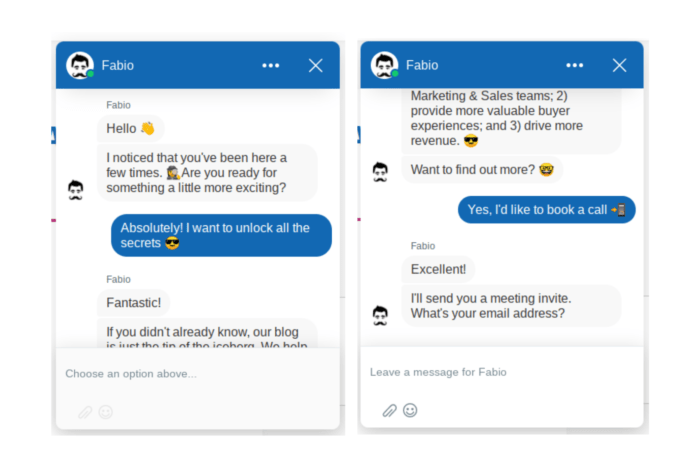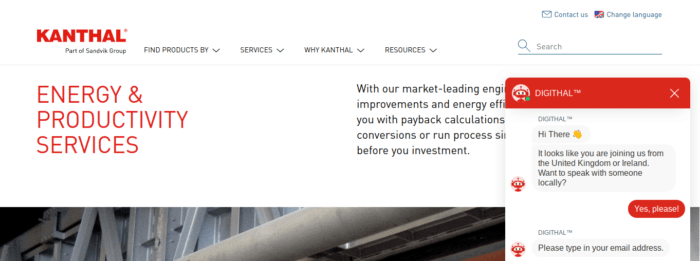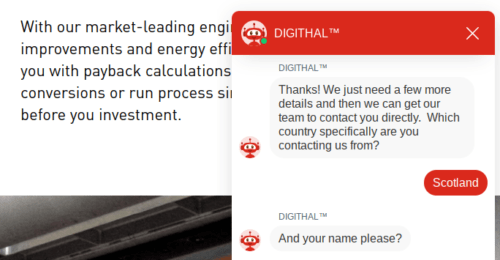Editor’s Note: This blog post was originally published on the Drift blog site. LeadFabric was selected as Drift’s inaugural Premier Partner as recognition for their performance as the top partner in EMEA.
In 12 short years, I’ve seen a ton of transformation in the world of B2B sales and marketing.
We’ve seen the growth of SaaS and experienced the genius of automation. Yet like many of my clients, we began searching for something new – a balance between the power of automation and the irreplaceable touch of human interactions.
When we launched LeadFabric in 2008, we set out to introduce companies to marketing automation, as well as help them align their sales and marketing goals. Since then, we’ve learned a lot. As the world continues to morph into a global marketplace, we’ve focused on servicing and supporting enterprise B2B customers to help pivot their marketing efforts to a global mindset.
Half of our business is about servicing the EMEA subsidiaries of North American Enterprises that outsource their overseas Marketing Operations work to a trusted service provider. The other half comes from European businesses that come to us for our B2B marketing transformation consulting services. And most recently, we expanded our presence to APAC in the Republic of China.
That’s why our team of marketing agencies look like they do:
🌍 We represent 10 different nationalities
🗣️ We speak 14 languages
✈️ We’re spread out across five global locations and three continents
Now, our time is spent with our core base of 60-80 customers, and we’re introducing them to something new – Conversational Marketing. Using automated playbooks and starting conversations with customers (instead of robotic answers), we’ve netted our clients some amazing results.
I’m talking $1M extra in the pipeline and 40%+ boosts in close rates.
Here’s why I think getting the balance between human touch and automation is so important in today’s B2B sales environment, plus a behind-the-scenes look at the Conversational Marketing strategies (and results) for three of our clients.
Let's talk about the elephant in the room
The world we live in runs (and relies) on conversations.
Even today’s leading marketing strategies have adopted this way of thinking. After all, it’s what has led us to marketing automation. However, somehow automation has turned into a one-way street for marketers. We gather information so we can “personalize” conversations and drip-feed information to leads. The problem is that, while we can use this information to personalize the way we communicate with customers, the methods we use to deliver these messages are glaringly automated.
And (this should come as no surprise), our buyers know that they’re not having a personalized conversation.
A few years ago, we realized that marketing automation had hit a point where every company was nurturing their leads and becoming “relevant” through automation. The existing tools lifted everybody onto an even playing field, and in the process, made them almost redundant. There was an overload of messages in the inbox. Nobody was standing out anymore.
We knew we had to find a way to help our clients stand out. To bring back the human dimension to marketing automation. And to stop over-automation.
So in 2018, we began our partnership with Drift. ⚡️
The move made sense. We deploy the Driftbot on our own site to generate leads and close deals, so it only made sense to let our clients in on the action:

And now, we’re Drift’s EMEA Premier Partner. What draws us to Drift is it ticks the ultimate box – it brings back a human feel to automation. It brings back the two-way conversation.
We love it because it gives better experiences to buyers who visit our client’s websites, and in turn, helps boost their pipeline since it meets people where they’re at in their buying journeys.
Don’t believe me? Here are three examples from clients we’ve worked with at LeadFabric 👇
1. Global Manufacturer of Industrial Control Products Generates Over $1M Pipeline in Six Weeks
One of the world’s largest industrial automation companies came to us with a pretty impressive tech stack that integrates tools like Eloqua (aka Oracle Marketing Cloud). However, they had a hole to fill – boosting their website conversions, both for persona-based lead management as well as the ABM programs we are developing for them.
Problem: Automating the sales cycle with the company’s complex products
The company’s products are complex, expensive, and have long sales cycles.
Their existing lead generation wasn’t producing the results the company needed. So, we suggested they explore how adopting a Conversational Marketing framework could boost their inbound website traffic conversion and engagement numbers.
Solution: Conversational marketing playbooks deployed via Driftbot
We used Drift’s recommendation to build the client’s chatbot and playbook.
The first step was figuring out what areas of the website’s traffic we should target. We found three areas that had high-intent traffic and created playbooks to target each of them, and we also built two further playbooks to capture key target accounts.
The first three playbooks were product-focused. The aim was to qualify if people were interested in product subgroups, and if they ticked the right boxes, the Driftbot would then ask more specific details about product specifications or new/replacement parts. Only after this was a customer given the option to engage with a live chat agent. The bot had done the legwork to qualify the lead and get them into their funnel.
This is important because as the company’s products are so complex, live agents (aka humans!) have to get involved at some stage in every conversation. Their Driftbot can’t dig deeper into product interest, so conversions are left to the live chat.
What the bot is extremely helpful with is separating visitors from possible customers.
If a visitor is looking to buy, it moves fast to get them into a live chat with a sales rep. If they’re looking for further TOFU information, it automatically leads them down the right path to product documentation, product comparisons, software updates, or local office pages.
That’s one smart bot.
Result: 6 weeks -> $1m in pipeline opportunities
6 weeks after we deployed the bot and playbooks, the company generated over $1M in their pipeline and opened up another six-figure global opportunity. What’s even more promising is that the rollout was restricted to UK traffic coming from the global site as well as the UK-only website.
Once it is deployed to other areas like Germany, Austria, Italy, and the Middle East, we expect the pipeline to keep growing 📈
2. Telenet Increased Their Chat to Close Rate by 42%
Telenet is the part of the largest telecom group in the world (Liberty Global Media Group) and is one of the largest providers of cable broadband services in Belgium. Yet, its target customers are on the other end of the spectrum – small business owners and solopreneurs that only have time to hunt for marketing products outside of normal business hours.
Problem: Trouble converting leads outside its operating hours
Telenet’s core group of B2B customers fall into two groups: individual professionals or small organizations employing four or less people (SOHO) alongside SME and Enterprise organizations.
Their biggest barrier was that when their sales reps were contacting these two groups, they were busy and didn’t have time to chat about their product solutions. Telenet needed a way to engage with these customers outside of regular office hours and on the weekend.
Solution: Deploying defined playbooks to capture out-of-hours leads
We suggested Telenet use Drift to convert opportunities for the small office/home office (SOHO) market.
We’re talking about the low-hanging fruit in the B2B market – independent life supply stores, bakeries, construction firms, and even lawyers and consultants who need the internet and telephone – but they’re too busy during the day to find the right solution.
Telenet’s chatbot did two things: it engaged with SOHO businesses and gave them recommendations on which telecom bundle would fit their needs. Then, the business owner was given a calendar to book a time for a call-back with a sales rep that suited them. Filling in this communication gap allowed Telenet to pick up sales opportunities outside of their regular hours, and it also filled up their sales reps’ calendars as opportunities were automatically placed in their CRMs.
Now, it’s important to note that these chatbots were only deployed on nights and weekends when Telenet didn’t have sales reps at work. However, filling this communication hole was crucial to Telenet’s customer experience. We built a playbook around a specific product line, which allowed customers to find a bundle that worked for them while having conversations when they had time – not just during Telenet’s operating hours.
Result: Conversions up 25% and close rate up 40%
The chatbot took about a month to go live, but a week after it was launched, overnight and weekend conversions spiked by 25%.
SOHO opportunities were now going from visitors to qualified leads outside of office hours, meaning that when sales reps logged back into their calendars, prospects were ready to be sold to. This increased Telenet’s close-won rate by a whopping 40%. It was so successful that our LeadFabric team is currently writing the playbooks for other Telenet products 👌
3. Kanthal Used Driftbot to Nurture Leads and 5X Their Inbound Traffic
Kanthal launched in 1931 and sells heating elements for industrial furnaces. The company had already added a different chat solution to their tech stack – but they weren’t the results they were hoping for.
Problem: Old tech stack wasn’t paying off
Kanthal sells to a bunch of different industries like aluminum, automotive, electronics, ceramics, and even solar and semiconductors. The company was using Zendesk as a chat solution, but they were struggling to navigate the beginning of their “ETTD” path:
- Entry: How did the customer enter their nurture stream?
- Treatment: What should Kanthal serve up when a contact goes through the stream?
- Transition: How do contacts migrate from one stream to another in sync with their buyer journey progress?
- Disposition: When is a contact ready to be passed onto the sales team?
Kanthal had the later part of the path covered, but when it came to customers entering their nurture stream…they were coming up short.
Solution: Create specialized playbooks for high-intent product pages
In some ways, Kanthal had a head-start because their clients were already familiar with them, and if a visitor landed on their site, they assumed they were ready to buy. On the flip side, this created a loophole for Kanthal: clients were landing on their website, but they were not making themselves known, which made it almost impossible for their sales reps to upsell and cross-sell to clients.
So, we plotted out how to close those loopholes. We created playbooks that specifically targeted Kanthal’s TOFU leads on high intent product pages. We mapped out particular stages of the buyer's journey and aimed to convert them directly through a chatbot. Here’s an example of a TOFU conversation:

The chatbot will then redirect the lead to the right team, but not before asking a couple of extra questions, like the lead’s country, email address, and name:

After passing along some details that Kanthal’s team could use to personalize follow-up conversation, the lead then enters the appropriate nurturing stream.
Result: Less forms = more conversions
Just one month after deploying Drift, Kanthal improved its website conversion by 22%. For every five leads that were interacting with their chatbot, one would qualify.
Even more impressive is that the changes represented a 5x improvement on their inbound traffic numbers compared to forms. Kanthal’s Marketing Intelligence Analyst, Jason Cappiello, says the Driftbot has also had a positive impact on their customer’s experience.
“We can’t measure CX (customer experience) yet, but we’re pretty sure that the chatbot is also significantly improving our customer experience by adding a human touch into the equation,” Jason says. “Which provides further justification for our decision to deploy marketing automation alongside a Conversational Marketing solution.”
If You’re Not Using Driftbots – What Are You Waiting For?
Deploying conversational chatbots is all about trial and error. Sometimes your playbooks will land you some crazy results, and other times…they need some tweaking. But one thing you can count on is that they can open the door to your company having conversations with leads 24/7. Unlike legacy tech where you needed a team online to deal with chat inquiries, chatbots like Drift allow you to automate conversations – without losing that human feel.
For a while, it looked like marketers were in danger of falling into the over-automation trap. Now, I believe that as long as we are smarter with our automation choices, we can have human-like conversations with our customers – whether it’s on a weeknight, a weekend, or from another time zone and that in all sorts of languages. We can even take into account cultural differences by personalizing the formal versus informal required tone of voice apart from the actual language we have the bot talk in.
About the Author
Follow on Linkedin More Content by Koen De Witte










